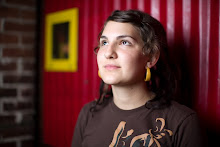
This is the story of how (or perhaps where) I found Advent this year- in a sort of soft, unlikely place. A place of waiting.
In my house there is a brown recliner. All tufted and worn down in the seat like the velveteen rabbit. It sits in foot warming distance to the black wood stove, and stares out the paneled window pane. What it sees is a scene that I carry in my mind like a proud parent photograph. Ask me and I'll show it to you. Don't ask me and I'll probably show it to you anyway. You'll see the field lined like an eye by the road and the creek. Decorated with blackberry bushes now lying dormant. And the hills that make the low places a valley. This is the view. And this chair is called the Brown Chair. Bet you weren't expecting that one. We talk about the Brown Chair with a sort of serious jest and a mutual understanding of frailty. Because for those of us living beside it in the little blue house on Hardscrabble Road, the Brown Chair is more than chocolate-coloured. It has more than a sudden, familiar twang when you crank up the foot rest like a jack in the box. It has also become our metaphor of transition, the epitome of helplessness, and the most sought after seat in the house.
I remember almost exactly two years ago when my sister sat in that chair on her wedding day and with the most childlike voice she owns, said only "weeeeeeell...." and continued sitting and staring despite a million things that needed doing. It's become a family joke. A funny remembering when one of us sits in imitation of her and croons "weeeeeeell..." We all understand. Because we've all sat there, and watched over each other when it was someone else's turn to sit in the Chair.
Today my dad was giving me a brief history of missions from Perpetua to Whitman (a summarized version of the college course he just finished teaching,) and sharing with me the excitement of being a graduate school student. I, of course, need to first figure out the excitement of being an undergrad student. Like father like daughter? I could see all the wheels spinning in his head as he talked, like the innards of the grandfather clock he made mom. They rotated in the unique way they do with him- metal parts unlabeled and in perpetual overdrive, but solid and steady anyway. He's using himself in the way that burns every calorie and brain cell and leaves him feeling spent and purposeful. For humans this way of spending ourselves is hit and miss. Sometimes we find it, sometimes we just sort of... float. And our exhaustion then comes from a feeling of airyness, and a deep fear that we are a figment of our imagination... or worse yet, of God's. It's been awhile since I've seen my dad this charged. He moved out of the Brown Chair. Which is a good thing, because a few days ago I came home from India and I needed to move in.
When you're in the Brown Chair people make you cups of tea and build you fires. When you sit on its hollow and let it hug you in the way a wall does, you don't mind that you're eating breakfast at what was dinner time only two nights ago. You don't mind that you can't find the words to tell people how you feel because words come from something, and there is nothing inside you. You don't mind that for some reason every person you've ever loved has come to mind and you haven't missed them or laughed at old jokes, but just held them with you, there in your confusion. Maybe it comforts you when you're too numb from the sting of change to realize you're hurting. Maybe it tells you again who you are when you're too jet lagged to remember. I may be in the Brown Chair for awhile. Until I can get my "feelers" back, as a good friend calls his feelings. Until my words come from something, even something undone.
Leaving the Brown Chair starts small. Baby steps, they call it. Tonight I got out of the Brown Chair to thank a few courageous high schoolers for loving my friend Imagination who lives on the street in Kolkata. They are fighting for her by providing for her. They humble me, because they haven't even seen her pain, or the way she welcomes you and draws you in. Not just you, but every stranger and random by-passer. They love because they're seeing with their hearts instead of their eyes. Tomorrow I will get out of the Brown Chair so that I can wear high heels. One can't very well wear them in that chair, but to go to the ballet I find bright red ones are best. Soon I will get out long enough to go walking in the rain that's hardly stopped since I got home. I might even cry. And then I will come quickly back to the safety of the Brown Chair, and try to give myself the grace that others must right now.
I'm glad Christmas is almost here. This captive Israel has gotten a little tired of half singing, half begging, "O come, please come quickly, Emmanuel." But today, from where I sat writing this in the Brown Chair, I could see on the mantel a tiny manger made of banana leaf. In the midst of my recent quivering I remembered a journey longer than mine. I remembered to wait with baited breath for something that has already come. And that now I sing in expectant hindsight.

